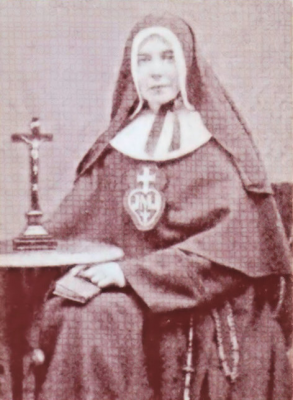Shrewsbury: Bishop prays Elizabeth Prout may be recognised as a Saint + video link

Elizabeth Prout
The Bishop of Shrewsbury has invited Catholics to pray that a 19th century religious Sister hailed as "the Mother Teresa of Manchester" may be recognised as a Saint.
The Rt Rev Mark Davies said that Shrewsbury-born Mother Elizabeth Prout was one of the most remarkable of all of the famous people from the town because of her work and witness among some of the poorest people of Victorian England.
The Bishop described Mother Elizabeth as an "educational pioneer" who founded schools for the industrialised poor and refuges for factory girls as she "dedicated her life to the service of the most abandoned".
He said she was inspired by her Catholic faith to confront "the most degrading situations with the confidence of the revolution which flows from Christ's command: 'Love one another as I have loved you'."
The Bishop expressed the hope that Mother Elizabeth would be recognised for her witness to the inviolable dignity of all human life, which he described as the "labour of her life".
Bishop Davies noted that Mother Elizabeth significantly came to Manchester during the same period that Karl Marx and Friedrich Engels also visited the city as they prepared to write The Communist Manifesto.
While the two revolutionary philosophers sat together "to formulate the violent theory of Communism; an ideology that would bring still greater suffering to humanity", said Bishop Davies, "Elizabeth risked violence herself to enter Manchester's darkest and most dangerous streets in order to reach those in greatest need".
"If Marx and Engels merely observed the condition of the poor, Elizabeth desired to live and die among them," the Bishop continued. "She became a sister to the abandoned so they might recognise their own innate dignity as children of God."
The words of the Bishop came in a homily preached at Shrewsbury Cathedral on September 2, the 200th anniversary of the birth of Mother Elizabeth at Coleham, Shrewsbury, where her father, Edward, worked as a cooper for a local brewery.
The Mass was attended by members of the Sisters of the Cross and Passion, the religious institute co-founded by Mother Elizabeth.
Bishop Davies said: "Two centuries later, what can the life of Elizabeth Prout teach us in this 21st Century? From the banks of the Severn where her story began, I wish to point very simply to where, I believe, her witness will shine out ever more clearly in years to come. Wherever human life is devalued and discarded - in what Pope Francis describes today as a 'throw-away culture' - Elizabeth teaches how human dignity and true social progress are bound-up with love, Divine Love.
"She saw clearly that it was only by discovering that we are loved by God that the innate and eternal worth of every human life is recognised and held secure. This was to be the labour of her life and her universal and enduring witness. In the face of the overwhelming denial of human dignity in the first industrial slums, Elizabeth took remarkable steps in both education and social care which continue to show us how human suffering always demands the service of love, not merely public services.
"In societies where there is an urgent call for new evangelisation, she exemplifies that it is only by the discovery of interior life - of intimate, friendship with Christ - that we will be able to go beyond the limits imposed by our fears and so respond to our Christian calling. For these reasons, and for many others that will be more eloquently set out in years to come, we today ask her prayers; and dare to pray that this woman of Shrewsbury - the Servant of God Elizabeth Prout - may soon be recognised among the Blessed of every time and place."
Visit Diocese of Shrewsbury website: www.dioceseofshrewsbury.org
A YouTube clip of Bishop Davies preaching his homily can be viewed here:
www.youtube.com/watch?v=8aZcaL7nOvg&t=41s
Homily preached at Shrewsbury Cathedral by the Right Rev Mark Davies, Bishop of Shrewsbury on the bicentenary of the birth of Servant of God Elizabeth Prout.
This historic town of Shrewsbury has seen many famous sons and daughters. Among them, Elizabeth Prout - born 200 years ago today - stands out as one of the most remarkable. In 19th Century England, Elizabeth was a single woman whose illness left her with a permanent disability and who would die at the age of 43. Yet, in that short life-time, she recognised the desperate, human need which marked the beginnings of the industrial revolution, and dedicated her life to the service of the most abandoned. Elizabeth's dynamic and enduring witness shows, in the Apostle's words how "perfect love casts out fear". i That perfect love Elizabeth found in the Cross of Christ and in the hidden life of work and family in Nazareth.
Significantly, Elizabeth would be led to the same industrial city where Karl Marx and Fredrich Engels had sat together to formulate the violent theory of Communism; an ideology that would bring still greater suffering to humanity. Yet, Elizabeth risked violence herself to enter Manchester's darkest and most dangerous streets in order to reach those in greatest need. If Marx and Engels merely observed the condition of the poor, Elizabeth desired to live and die among them. She became a sister to the abandoned so they might recognise their own innate dignity as children of God. It was this that made Elizabeth a pioneer of education, establishing day and night schools for the industrial poor and homes of refuge for factory girls. Together with a handful of companions she confronted the most degrading situations with the confidence of the revolution which flows from Christ's command: "Love one another as I have loved you".ii
Elizabeth's legacy would be a worldwide community of women - the Sisters of the Cross and Passion - committed to the same wide horizons of mission. Mother Mary Joseph would rejoice to see this birthday gathering of her Sisters in her hometown, whether physically present or via the internet. She would well understand the restrictions of a pandemic, having herself lived through the epidemics which swept the industrial communities of the north. Yet, the child born beside the River Severn two centuries ago could never have imagined that her life would one day be considered as exemplifying for all generations, the fulness of the Christian life and the perfection of charity. A life which would continue to speak in new and prophetic ways to this 21st century.
It is impossible to understand Elizabeth without opening the pages of Gospel where she learnt a preferential love for the poor and the most vulnerable. It may have been the Reverend Hugh Owen - who served both as Vicar of Saint Julian's and Mayor of Shrewsbury - who first awakened in her this life-long love for the poor. Sadly, we know little of her childhood. Yet, we do know that the decisive turning-point of her adult life came in the Staffordshire town of Stone. This was a call which came through the presence of Father Dominic Barberi. A priest regularly subjected to violence and harassment as he came to celebrate Mass beside Elizabeth's new home. The reviled figure of Blessed Dominic appears to have drawn Elizabeth's attention in the same way as the great Oxford intellectual, Saint John Henry Newman described in his Apologia, that Dominic's "very look had about it something holy ..."
The witness of the first Passionist mission in Staffordshire was instrumental in leading Elizabeth into full communion with the Catholic Church, where new paths in the interior life of prayer would be opened for her; nothing less than friendship with Christ who says to his disciples, "I call you friends...".iii This decisive step in Elizabeth's life came at the enormous cost of being disowned by her parents and being asked to choose between attending Mass and continuing to have a home and family. Yet this would be the moment when the Passion-centred spirituality of Saint Paul of the Cross led to the discovery of her vocation. Taking to heart the memory of the Holy Family of Nazareth and Christ's Passion and Cross, Elizabeth found the courage to travel alone to the industrial north; there among the degraded and discarded she dedicated a religious life to the recognition of the value and eternal destiny of every human being in those first slums.
Two centuries later, what can the life of Elizabeth Prout teach us in this 21st Century? From the banks of the Severn where her story began, I wish to point very simply to where, I believe, her witness will shine out ever more clearly in years to come. Wherever human life is devalued and discarded - in what Pope Francis describes today as a "throw-away culture" - Elizabeth teaches how human dignity and true social progress are bound-up with love, Divine Love. She saw clearly that it was only by discovering that we are loved by God that the innate and eternal worth of every human life is recognised and held secure. This was to be the labour of her life and her universal and enduring witness. In the face of the overwhelming denial of human dignity in the first industrial slums, Elizabeth took remarkable steps in both education and social care which continue to show us how human suffering always demands the service of love, not merely public services.iv In societies where there is an urgent call for new evangelisation, she exemplifies that it is only by the discovery of interior life - of intimate, friendship with Christ - that we will be able to go beyond the limits imposed by our fears and so respond to our Christian calling. For these reasons, and for many others that will be more eloquently set out in years to come, we today ask her prayers; and dare to pray that this woman of Shrewsbury - the Servant of God Elizabeth Prout - may soon be recognised among the Blessed of every time and place.
Mother Elizabeth Prout:
Mother Elizabeth Prout was born on September 2 1820 in Shrewsbury and she died from tuberculosis in St Helens, Lancashire, on January 11 1864 at the age of 43.
She was baptised in the Anglican Church of St Julian in Shrewsbury but was received into the Catholic faith in her early 20s by Blessed Dominic Barberi, the Italian missionary who would later receive St John Henry Newman into the Catholic Church.
At the age of 28 she became a nun and a few years later was given a teaching post in some of the poorest areas of industrial Manchester, working largely among Irish migrants, women and children, and factory workers.
At the time, Manchester was emerging as the world's first industrial city but conditions for the poor residents were so dire that in 1844, Friedrich Engels, co-author of The Communist Manifesto, described it as "this hell upon earth"
One observer in 1848 described the Angel Meadow district as "the lowest, most filthy, most unhealthy and most wicked locality in Manchester ... the home of prostitutes, their bullies, thieves, codgers, vagrants, tramps, and in the very worst sties of filth and darkness ... the low Irish".
Mother Elizabeth earned a reputation, however, for her tireless efforts in teaching, sheltering, feeding and nursing the needy there and for establishing a chain of schools and hostels across the other poverty-stricken parts of the North West of England.
She is considered to have been ahead of her time in teaching women skills to earn their own livings.
She attracted other women who were motivated by their faith to join her in her work, and more than 20 of them were formed into a religious community by 1857.
The new institute faced criticism for its so-called "revolutionary ideas" - namely of obliging religious sisters to earn their own wages to support themselves and by showing other women how to do the same.
But Pope Leo XIII approved the institute in 1863 and Elizabeth - known under the religious name of Mother Mary Joseph - was named as the first Superior General. Today, the institute is commonly known as the Passionist Sisters and its members continue to work with the poor and in education and retreats in Great Britain and Ireland, the United States, Australia, Papua New Guinea, Botswana, Chile, Argentina, Peru and Jamaica.
Mother Elizabeth was buried alongside fellow Passionists Blessed Dominic and Fr Ignatius Spencer, a relative of Princes William and Harry whose sainthood cause is being scrutinised by the Vatican.
Her own sainthood cause was submitted to the Vatican in 2008 for scrutiny by theologians and historians to ensure not only was there nothing in her background that may disqualify her but also to establish evidence of her sanctity.
If it is concluded that she lived a life of "heroic virtue" the search for two miracles will begin in earnest - one to declare her as Blessed and the other as a saint.
The last English female saints were Ss Margaret Clitheroe, Anne Line and Margaret Ward, who were among the 40 English and Welsh martyrs of the Protestant Reformation canonised by Pope St Paul VI in 1970.
The last non-martyr English female saint is St Margaret of Wessex, an 11th century Anglo- Saxon princess who became Queen of Scotland after the Norman invasion of William the Conqueror, and who was canonised in 1250.
The Diocese of Shrewsbury covers the parts of Merseyside south of the River Mersey, the southern parts of Greater Manchester, parts of Derbyshire, almost all of Cheshire and all of Shropshire.
Watch: A BBC video clip from last week which reports on the life of Elizabeth Prout as the Cross and Passion Sisters mark the 200th birthday of their foundress: www.youtube.com/watch?v=UzwG9tIHVPU


















